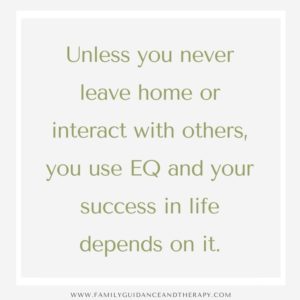You’ve probably heard the term “Emotional Intelligence” before, but what does it mean, exactly?
You can probably infer that it means being intelligent when it comes to emotions. And that is part of it. But emotional intelligence or emotional quotient - or “EQ” as it is commonly called - is so much more than that.
EQ is how we not only recognize and manage our own emotions, but the emotions of others - and it’s crucial for succeeding in both our personal and professional lives.
What is EQ?
EQ is made up of four components:
1. Self Management
Self-management means that you’re taking responsibility for your own behavior and well being. It also means that you’re able to manage your emotions in healthy ways and that you don’t act impulsively based on your feelings.
2. Self Awareness
Self-awareness means that you recognize your emotions and how they affect your thoughts and behavior. When you have self-awareness, you know yourself - your strengths and your weaknesses, who you are as a person, and what you bring to the table in your relationships and at work.
3. Social Awareness
When you have social awareness, you understand the feelings, needs and concerns of others, pick up on emotional cues, and understand the sometimes complex dynamics of your social group, workplace, or other organization.
4. Relationship Management
If you’re practicing relationship management, you know how to develop and maintain healthy relationships, communicate clearly, work as part of a team, and manage conflict.
The skills that make up EQ are very important for pretty much all of us, in both our personal lives and at school, work, and when interacting with other organizations.
Unless you never leave home or interact with others, you use EQ and your success in life depends on it. We all define “success” differently, but for most of us, success means finding meaning in our relationships, career, and other aspects of our lives.
People with higher IQ’s are not necessarily more successful or fulfilled in life. Someone can be renowned in their field or seen as a brilliant or highly successful entrepreneur, but may struggle with their personal relationships.
The Importance of EQ
EQ affects your performance at work or school, your mental health, and even your physical health! So you can see why it’s a crucial life skill.
The Institute for Health and Human Potential cites a 2003 Harvard Business Review article reporting that 80% of competencies that differentiate top performers from others are in the domain of Emotional Intelligence.
The country’s top leaders depend on EQ to succeed.
In fact, workplaces and schools are starting to incorporate EQ education programs.
SEL (Social Emotional Learning) programs in schools have been shown to help children increase social skills, such as kindness, sharing, and empathy, improve attitudes toward school, and reduce depression and stress in students.
Related: Raising an emotionally Inteligent Child
Studies have also found that schools that implement SEL programs have decreased levels of bullying and violence.
Researchers have found that, when it comes to the workplace, emotional intelligence training boosts employee productivity and results in better evaluations from management.
Can I Still Develop EQ As An Adult?
Although we’ve only recently discovered the benefits of beginning EQ education early, it’s not too late for you to develop EQ and use it to your advantage!
Because EQ is made up of those four pieces - self-management, self-awareness, social awareness and relationship management - it can be difficult to achieve them all, or to even know where you may be lacking.
If you’d like a quick look at where your strengths and weaknesses lie, the Harvard Business Review has developed an EQ quiz which will give you results in just a few moments.
The quiz results can give you an idea of where you are in each area of EQ and what you can improve to increase your overall level of Emotional Intelligence.
If you’re having problems controlling your emotions, you can try methods for managing stress, such as saying “no” when you know that you really can’t take on any more responsibilities or relieving stress through journaling, meditation, or exercise.
If you’re struggling with relationship management skills like communication and conflict resolution, you can take an online course in EQ or ask your employer about implementing an Emotional Intelligence course.
These types of courses yield real results.
Anika Nayak, a freelance journalist, reported that LinkedIn’s online course helped her to not only develop EQ, but to improve her relationships and day-to-day life.
EQ Makes For a Better Quality of Life
Over the past several years, we’ve come to realize that EQ is very important when it comes to living a happy and successful life. It can help you to achieve your goals both in the workplace and in your personal life. It can give you confidence and improve your relationship skills, leadership skills, and emotional resilience.
Many of the aspects of Emotional Intelligence, particularly self-awareness and self-management, can be helped with talk therapy, especially if you’re feeling stressed or emotional a lot of the time.
If you’re interested in learning more about how we can help, make an appointment online or by calling 619-600-0683 or texting us at 619-607-1230.
We are committed to helping you make lasting change in your life.

